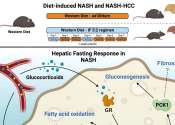Mouse study shows intermittent fasting protects against liver inflammation and liver cancer
Fatty liver disease often leads to chronic liver inflammation and can even result in liver cancer. Scientists from the German Cancer Research Center (DKFZ) and the University of Tübingen have now shown in mice that intermittent ...
May 7, 2024
0
65









